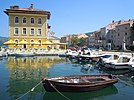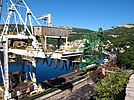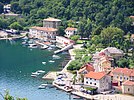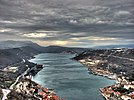world.wikisort.org - Croatia
Bakar (Italian: Buccari, Hungarian: Szádrév) is a town in the Primorje-Gorski Kotar County in western Croatia. The population of the town was 8,279 according to the 2011 Croatian census, including 1,473 in the titular settlement.[3] Ninety percent of the population declared themselves Croats by ethnicity. The largest ethnic minority are the Serbs with 2.91% of the population. The old part of Bakar is situated on a hill overlooking the Bay of Bakar. "Bakar" is the Croatian word for copper.
Bakar | |
|---|---|
Town | |
| Grad Bakar Town of Bakar | |
 Flag | |
 Bakar Location of Bakar in Croatia | |
| Coordinates: 45°19′40″N 14°32′10″E | |
| Country | |
| County | |
| Settled | 1st century |
| Named | 1288 |
| Free city | May 13, 1798 |
| Royal Borough | April 23, 1799 |
| Government | |
| • Mayor | Tomislav Klarić (HDZ) |
| • City Council | 15 members[1] |
| Population (2011)[2] | |
| • Total | 8,279 |
| Time zone | UTC+1 (CET) |
| • Summer (DST) | UTC+2 (CEST) |
| Area code | 051 |
| Website | www |
Bakar is a port for bulk cargo and used to be known for its industrial complex that included a coke factory, which produced a considerable amount of pollution. Bakar's coke factory was closed in 1995 and the area's pollution has subsided significantly.
Municipality
| Population of settlements in Bakar, 2011: | |
| Bakar | 1,473 |
| Hreljin | 2,206 |
| Krasica | 1,353 |
| Kukuljanovo | 905 |
| Plosna | 44 |
| Ponikve | 45 |
| Praputnjak | 593 |
| Škrljevo | 1,344 |
| Zlobin | 316 |
Demographics
| population | 11497 | 10401 | 10022 | 9977 | 9804 | 9603 | 10137 | 8658 | 6953 | 7079 | 7788 | 8008 | 7469 | 7577 | 7773 | 8279 | 7581 |
| 1857 | 1869 | 1880 | 1890 | 1900 | 1910 | 1921 | 1931 | 1948 | 1953 | 1961 | 1971 | 1981 | 1991 | 2001 | 2011 | 2021 |
Coat of arms
Bakar was granted its coat of arms and town privileges in 1799 by Empress Maria Theresa. The coat of arms was in the artistic style typical for the period, with a cartouche with large landscapes and ornamentation around the shield within a circular inscription.
The shield of the coat of arms features a red-and-white checkered top or "chief", with three local gray stone castles on green hills in the middle, and a black anchor on orange at the bottom.
Recognizable buildings

- Turkish house: built by an unknown architect, possibly in the 14th century, this peculiar building resembles Ottoman architecture. Following 1965 reconstruction the house served as an artistic atelier.
- Roman house: former monastery, built in the 18th century
- Parish church of St. Andrew the Apostle: originally built in the 12th century and destroyed in 1323 by earthquake. In the Middle Ages its catacombs were used for wealthy people to hide from plague that passed the city. It is the third largest late Baroque church in Croatia.
- Kaštel (Castel): A castle built in the 16th century by the order of Emperor Ferdinand I and used as a protection against the Turks. It has three kitchens, two dungeons, little chapel of St. Michael, and many other rooms.
History


In the late 19th and early 20th century, Bakar was a district capital in the Modruš-Rijeka County of the Kingdom of Croatia-Slavonia.
World War I
In February 1918 during WW I Gabriele D'Annunzio and Costanzo Ciano took part in a daring, if militarily irrelevant, naval raid on the harbour of Bakar (known in Italy as La beffa di Buccari, lit. "The Bakar Mockery"), helping to raise the spirits of the Italian public.
After WWI, from the end of 1920, Bakar was one of the major points of entry of thousands of Russian refugees, arriving in the Kingdom of SHS following the end of the Russian Civil War in the European part of the former Russian Empire, mostly from Crimea, after the final defeat of White armies under general Wrangel there in November 1920.
World War II
During WW II, in Bakar was an Italian concentration camp, where civil population from Province of Ljubljana,[4] as well as Croats and Serbs was interned. It the peak, there was 893 internees.[5]
Trivia
In 1972 director Radley Metzger filmed his movie Score in Bakar, Croatia.
References
- "Objava konačnih rezultata" (in Croatian). Retrieved 30 May 2017.[permanent dead link]
- "Popis stanovništva 2011" (in Croatian). Retrieved 30 May 2017.
- "Population by Age and Sex, by Settlements, 2011 Census: Bakar". Census of Population, Households and Dwellings 2011. Zagreb: Croatian Bureau of Statistics. December 2012.
- Ivanka Zamida: a survivor's testimonial, from 2013 exhibition "The Last Witnesses", National Museum for Contemporary History, Ljubljana
- Bakar concentration camp, Online Research project
External links
На других языках
- [en] Bakar
[ru] Бакар
Ба́кар (хорв. Bakar) — город в Хорватии, в Приморско-Горанской жупании. Город находится на побережье Адриатического моря, в глубине Бакарской бухты, выходящей в залив Кварнер.Другой контент может иметь иную лицензию. Перед использованием материалов сайта WikiSort.org внимательно изучите правила лицензирования конкретных элементов наполнения сайта.
WikiSort.org - проект по пересортировке и дополнению контента Википедии








